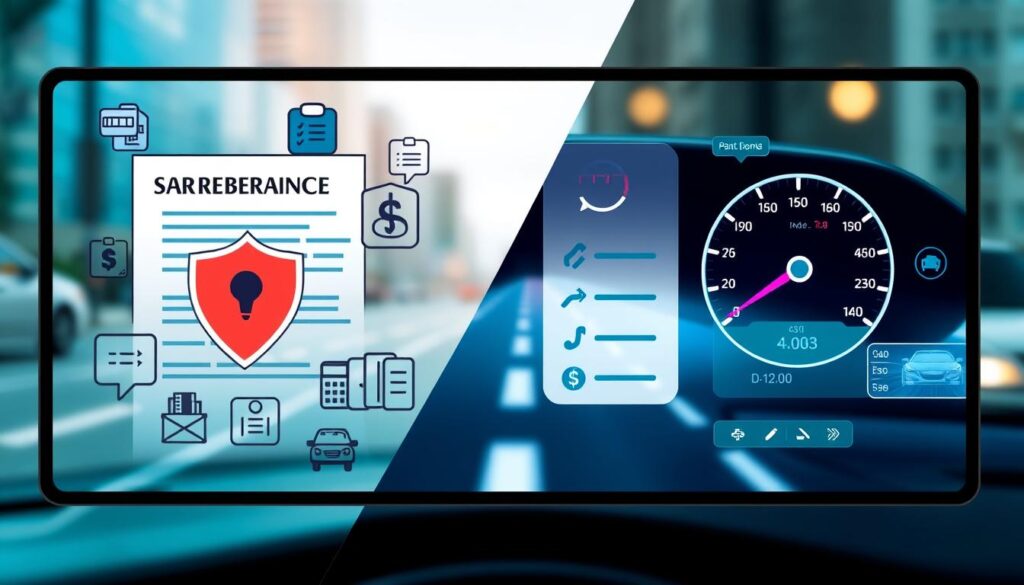Car Insurance: How to Save Money Without Compromising Coverage
Finding ways to save on car insurance is key as costs keep going up. This guide will show you how to cut down on car insurance costs.
Anúncios
You’ll learn about different coverage types, discounts, and how to keep your driving record clean. These tips will help you save money without losing the protection you need.
The Importance of Adequate Car Insurance Coverage

Keeping yourself, your car, and others safe on the road is key. That’s why car insurance coverage is so important.
Knowing about liability coverage, collision coverage, and comprehensive coverage helps you make smart choices. It also helps you avoid the financial dangers of being underinsured.
Anúncios
Liability coverage is the basic kind of car insurance. It covers damages and injuries you cause to others in an accident.
Collision coverage pays for fixing or replacing your car if you hit something.
The Risks of Being Underinsured
Being underinsured can cost you a lot of money.
If you’re in an accident and your insurance isn’t enough, you might have to pay for damages and medical bills yourself.
This can be very expensive and hurt your finances. Having enough car insurance coverage keeps you safe and gives you peace of mind.
“Adequate car insurance coverage is essential to protect yourself, your vehicle, and other drivers. It’s better to be safe than sorry when it comes to unexpected events on the road.”
Factors that Affect Car Insurance Rates
Many things can change how much you pay for car insurance. Your driving history and the type of car you drive are key. Knowing these can help you find better insurance deals.
Your age is a big deal for insurance prices. Drivers under 25 usually pay more because they’re newer to driving. As you get older, your rates often go down.
How you drive is also important. Tickets for speeding or accidents can raise your rates. Keeping a clean driving record helps you get better rates.
Where you live also matters. Insurance costs can change a lot depending on your area. Places with more accidents or theft tend to have higher rates.
| Factor | Impact on Car Rates |
|---|---|
| Age | Younger drivers face higher rates due to limited experience |
| Driving Record | Speeding tickets, accidents, and violations lead to higher premiums |
| Vehicle Make and Model | Factors such as safety features, repair costs, and theft risk influence rates |
| Credit Score | A higher credit score generally correlates with lower insurance costs |
| Geographical Location | Rates can vary significantly based on your city or state |
The type of car you drive also affects your insurance. Things like safety features and how easy it is to repair can change your rates.
Lastly, your credit score matters too. Insurance companies use your credit score to set rates. A better score usually means lower costs.
Knowing what affects your car insurance can help you find the best deal. This way, you can get good coverage without spending too much.
Car Insurance: Shopping Around for the Best Deals
Finding the right car insurance can seem hard. But, by shopping around and comparing quotes from multiple providers, you can find great deals.
This guide will help you compare quotes and negotiate for better rates.
Comparing Quotes from Multiple Providers
To get the best car insurance deal, explore options from a variety of insurers. Get quotes from at least three to five different providers. This way, you can make a smart choice and get the best rates.
- Use online comparison tools to get quotes fast and easy.
- Give accurate info about your driving, vehicle, and coverage needs for accurate quotes.
- Look at the premiums, coverage levels, deductibles, and any extra features or discounts.
Negotiating for Better Rates
After getting your quotes, don’t be shy to negotiate with the insurers for better rates. Many insurers want your business, so use the competitive quotes you have.
- Tell the insurer you’ve gotten lower quotes from others and ask if they can match or beat them.
- Point out any good things about your driving record or personal situation that might lower your premium.
- Think about raising your deductible or changing your coverage levels to find a good balance between cost and protection.
By shopping around and negotiating, you can get the car insurance coverage you need at the most competitive rates. Don’t accept the first quote you get. Take time to look at your options and fight for the best deal.
Discounts and Bundling Opportunities
Smart shoppers can save money on car by using discounts and bundling options. These include safe driver discounts and bundling car insurance with other policies.
This way, you can lower your premiums and get more value from your insurance.
Taking Advantage of Safe Driver Discounts
Keeping a clean driving record can greatly reduce your car insurance costs.
Many insurers give safe driver discounts to those who avoid accidents and tickets. These discounts can be up to 30% off, depending on the company and your driving history.
To get these discounts, you usually need to have a certain number of years without any claims or tickets.
Some insurers also offer discounts for defensive driving courses or safety features like anti-theft devices. By improving your driving and making your car safer, you can save a lot on car insurance discounts.
Bundling Car Insurance with Other Policies
Bundling your car insurance with other policies can also save you money. For example, combining car insurance with homeowner’s or renter’s insurance can give you discounts of 5% to 25%.
This is because many providers offer lower rates for customers who choose to get all their insurance from one place.
| Discount Type | Potential Savings |
|---|---|
| Safe Driver Discount | 5% to 30% |
| Defensive Driving Course Discount | 5% to 15% |
| Anti-Theft Device Discount | 5% to 15% |
| Bundling Discount | 5% to 25% |
By using these discounts and bundling options, you can cut your car insurance costs a lot. You won’t have to give up the coverage you need to keep you and your vehicle safe.
Raising Deductibles to Lower Premiums
One way to cut down on car insurance costs is to raise your deductible.
A deductible is the amount you pay before your insurance starts covering. By increasing your deductible, you can lower your car premiums a lot.
Raising your deductible can save you a lot on your insurance payments. But, it’s important to find the right balance. You want to save money but still have enough coverage. Let’s look at the good and bad sides of this:
- Pros of Raising Deductibles:
- Significantly reduces your car insurance premiums
- Encourages you to be more careful on the road
- Offers a safety net for big accidents while saving on small ones
- Cons of Raising Deductibles:
- Increases what you pay for small claims
- Needs you to have enough savings for the higher deductible
- May not work for those who can’t afford a bigger deductible
Before raising car insurance deductibles to lower your premiums, think about your money and driving history. Finding the right balance can save you a lot without sacrificing coverage.
“Increasing your deductible is one of the most effective ways to lower your car insurance costs. Just be sure you have enough savings to cover the higher out-of-pocket expenses in case of an accident.”
Car Insurance and Your Driving Record
Your driving record is key in setting your car insurance rates. Insurers look at your history of moving violations, accidents, and other incidents.
They use this to figure out how much risk you pose as a driver. This section will cover how these factors affect your insurance rates and how to keep your record clean.
The Impact of Moving Violations and Accidents
Moving violations, like speeding tickets or running red lights, can raise your insurance costs a lot.
Each violation is a warning sign for insurers, showing a higher risk of claims. At-fault accidents also increase rates, showing unsafe driving habits.
The severity and how often these incidents happen matter a lot. The more violations or accidents, the higher your premiums will be.
Insurers see drivers with a history of risky behavior as more likely to make claims. They then charge higher rates to cover these risks.
| Incident | Average Increase in Car Insurance Rates |
|---|---|
| Speeding Ticket | 20-30% |
| At-Fault Accident | 30-40% |
| DUI/DWI Conviction | 100-200% |
The effects of these incidents can last for years. Insurers usually look at the past 3-5 years when setting your rates. Keeping your driving record clean is essential for lower insurance costs.

Maintaining a Good Credit Score for Better Rates
Your credit score plays a big role in the car insurance rates you get. Insurance companies see a good credit score as a sign of financial responsibility.
This can lead to lower premiums. Keeping a good credit score helps you get better rates and save money on insurance.
There’s a clear link between credit score and insurance rates. Drivers with high credit scores tend to file fewer claims. This makes them less risky for insurers, leading to lower premiums for them.
Tips for Improving Your Credit Score
- Pay your bills on time: Payment history is key to your credit score. Make sure to pay all bills, including credit cards and loans, on time.
- Keep credit card balances low: Try to use less than 30% of your available credit. This shows you’re not overspending.
- Monitor your credit report: Check your credit report for errors and dispute any found. A clean report can boost your score.
- Diversify your credit mix: Having different types of credit, like cards and loans, can help your score. It shows you can handle various credit types.
- Avoid frequent credit applications: Too many credit applications can lower your score. Only apply for credit when necessary.
By following these tips and keeping a good credit score, you can get lower car insurance rates. Improving your credit takes time and effort but can save you money in the long run. It’s a smart investment for your financial future.
| Credit Score Range | Average Insurance Rate |
|---|---|
| 800-850 | $1,200 |
| 720-799 | $1,400 |
| 680-719 | $1,600 |
| 620-679 | $1,800 |
| 580-619 | $2,000 |
| 500-579 | $2,200 |
“Maintaining a good credit score is not just about getting a better car insurance rate. It’s about taking control of your financial future and positioning yourself for long-term financial stability.”
Understanding what affects car insurance rates is key
By using the tips from this guide, you can save money on your premiums. This doesn’t mean you have to give up on the coverage you need.
Shopping around and using discounts can help a lot. Keeping a clean driving record and good credit also matters. These steps ensure you get the best deal on your car insurance.
Car insurance is more than just finding the cheapest option. It’s about getting the right protection for your car and finances. By focusing on savings, coverage, and affordability, you make smart choices. These choices give you peace of mind and protection.
Whether you’re new to driving or have years of experience, being proactive with your car insurance is crucial. Follow the strategies from this guide. You’ll find more affordable and comprehensive coverage for your car.
